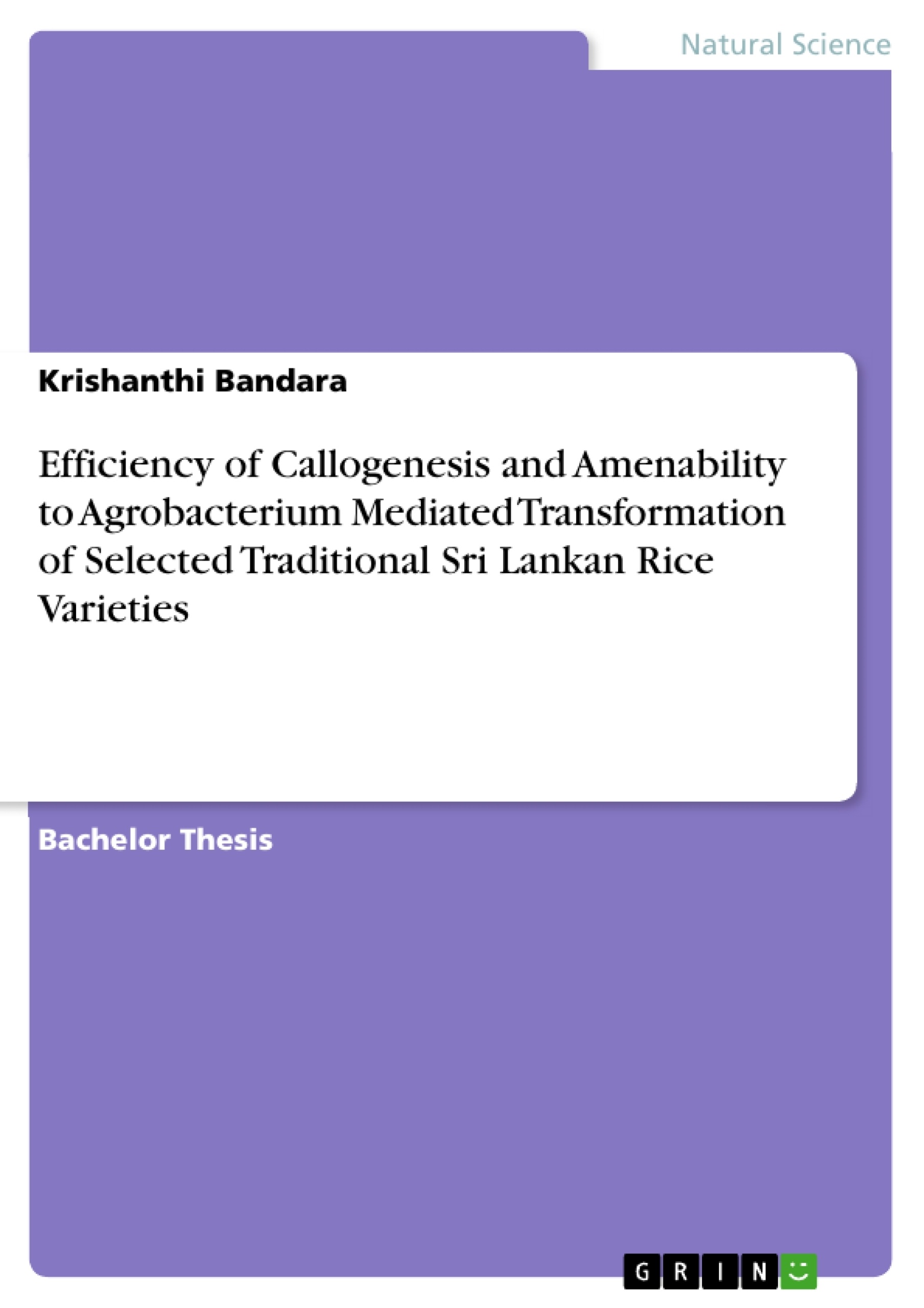
Efficiency of Callogenesis and Amenability to Agrobacterium Mediated Transformation of Selected Traditional Sri Lankan Rice Varieties
Bachelorarbeit, 2012
59 Seiten, Note: A pass
Leseprobe
Inhaltsverzeichnis (Table of Contents)
- CHAPTER 1
- INTRODUCTION
- Background
- Justification
- CHAPTER 2
- LITERATURE REVIEW
- Rice
- Genetic transformation of plants
- Development of rice transformation system
- Suitable rice explants for genetic transformation
- Applications of Agrobacterium mediated transformation of rice
- CHAPTER 3
- MATERIALS AND METHODS
- Plant material
- Culture media
- Vector and bacterial strain
- Callus derivation
- Agrobacterium mediated calli transformation
- Detection of transformants using GUS analysis
- Experimental design and Data Analysis
- CHAPTER 4
- RESULTS
- Callus induction
- Genetic transformation of rice
- CHAPTER 5
- DISCUSSION
- Rice explants for callus formation
- Surface sterilization of seeds before inoculation
- Nutrient media for callus induction
- Callus initiation and growth
- Effect of other minor nutrients on callogenesis
- Efficiency of genetic transformation of callus by Agrobacterium mediated method
- CHAPTER 6
- CONCLUSIONS AND SUGGESTIONS
- Conclusions
- Suggestions
Zielsetzung und Themenschwerpunkte (Objectives and Key Themes)
This report investigates the optimization of callus induction and transformation protocols for selected traditional Sri Lankan rice varieties using Agrobacterium mediated transformation. The study aims to enhance the efficiency of gene transfer and establish a reliable method for unlocking the valuable traits, such as pest resistance and nutritional value, inherent in these traditional varieties.
- Callus induction efficiency and its dependence on genotype.
- Optimal hormone concentrations for callus induction in various rice varieties.
- Evaluation of Agrobacterium-mediated transformation efficiency in diverse traditional rice varieties.
- The potential of Agrobacterium-mediated transformation for genetic modification in Sri Lankan rice varieties.
Zusammenfassung der Kapitel (Chapter Summaries)
Chapter 1 introduces the study's background and justification, highlighting the significance of traditional rice varieties and the potential of genetic transformation techniques for unlocking their inherent traits. Chapter 2 provides a comprehensive literature review, discussing the biology of rice, the principles of genetic transformation, and the development of specific rice transformation systems. Chapter 3 details the materials and methods used, including plant material selection, culture media preparation, vector and bacterial strain information, callus derivation protocols, Agrobacterium-mediated transformation procedures, GUS analysis for detection of transformants, and experimental design and data analysis. Chapter 4 presents the results obtained from the study, focusing on the efficiency of callus induction and the transient transformation efficiencies observed for various rice varieties. Chapter 5 discusses the results, exploring factors influencing callus formation, the importance of surface sterilization, the role of nutrient media, and the impact of genotype on the efficiency of Agrobacterium-mediated transformation. Chapter 6 summarizes the conclusions drawn from the study and proposes future directions for further research in this field.
Schlüsselwörter (Keywords)
The report focuses on the efficiency of callogenesis and the amenability to Agrobacterium-mediated transformation of selected traditional Sri Lankan rice varieties. Key terms include callogenesis, Agrobacterium-mediated transformation, traditional rice varieties, genetic transformation, GUS analysis, callus induction, transient transformation efficiency, and Sri Lankan rice varieties.
Frequently Asked Questions
What are the benefits of traditional Sri Lankan rice varieties?
They possess important traits such as high nutritional and medicinal value, as well as resistance to drought and pests.
What is callogenesis in plant tissue culture?
It is the process of inducing the formation of a callus (a mass of unorganized cells) from plant explants, like seeds, using specific hormones.
Which hormones were used for callus induction in this study?
The study used combinations of 2,4-D and kinetin to find the optimal concentrations for different rice varieties.
What is Agrobacterium-mediated transformation?
It is a technique that uses the soil bacterium Agrobacterium tumefaciens to transfer specific genes into the plant genome.
How were the transformed calli detected?
The study used GUS analysis to detect the presence of the transferred genes in the rice callus.
Is callus induction dependent on the rice variety?
Yes, the results showed that callus induction efficiency is genotype-dependent, meaning it varies significantly between different rice varieties.
Details
- Titel
- Efficiency of Callogenesis and Amenability to Agrobacterium Mediated Transformation of Selected Traditional Sri Lankan Rice Varieties
- Veranstaltung
- Molecular Biotechnology
- Note
- A pass
- Autor
- Krishanthi Bandara (Autor:in)
- Erscheinungsjahr
- 2012
- Seiten
- 59
- Katalognummer
- V367829
- ISBN (eBook)
- 9783668470248
- ISBN (Buch)
- 9783668470255
- Dateigröße
- 898 KB
- Sprache
- Englisch
- Schlagworte
- efficiency callogenesis amenability agrobacterium mediated transformation selected traditional lankan rice varieties
- Produktsicherheit
- GRIN Publishing GmbH
- Preis (Ebook)
- US$ 19,99
- Preis (Book)
- US$ 29,99
- Arbeit zitieren
- Krishanthi Bandara (Autor:in), 2012, Efficiency of Callogenesis and Amenability to Agrobacterium Mediated Transformation of Selected Traditional Sri Lankan Rice Varieties, München, Page::Imprint:: GRINVerlagOHG, https://www.diplomarbeiten24.de/document/367829
- Autor werden
- Ihre Optionen
- Vertriebskanäle
- Premium Services
- Autorenprofil
- Textarten und Formate
- Services für Verlage, Hochschulen, Unternehmen

- © GRIN Publishing GmbH.
- Alle Inhalte urheberrechtlich geschützt. Kopieren und verbreiten untersagt.
- info@grin.com
- AGB
- Open Publishing
Der GRIN Verlag hat sich seit 1998 auf die Veröffentlichung akademischer eBooks und Bücher spezialisiert. Der GRIN Verlag steht damit als erstes Unternehmen für User Generated Quality Content. Die Verlagsseiten GRIN.com, Hausarbeiten.de und Diplomarbeiten24 bieten für Hochschullehrer, Absolventen und Studenten die ideale Plattform, wissenschaftliche Texte wie Hausarbeiten, Referate, Bachelorarbeiten, Masterarbeiten, Diplomarbeiten, Dissertationen und wissenschaftliche Aufsätze einem breiten Publikum zu präsentieren.
Kostenfreie Veröffentlichung: Hausarbeit, Bachelorarbeit, Diplomarbeit, Dissertation, Masterarbeit, Interpretation oder Referat jetzt veröffentlichen!
- GRIN Verlag GmbH
-
- Nymphenburger Str. 86
- 80636
- Munich, Deutschland
- +49 89-550559-0
- +49 89-550559-10
- info@grin.com
-









